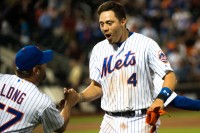
I’m a traditionalist when it comes to baseball. However, I’m not against making things more fun for the crowd. I though about this with the Mets contest allowing you to announce the Mets lineup:
Ever wanted to announce the #Mets lineup? RETWEET this for a chance to win #BetterMattersSweepstakes Rules: http://t.co/QBh9CRtBdH
— New York Mets (@Mets) September 22, 2015
All MLB stadiums follow the same general pattern. They dutifully announce the players in the mold of Bob Sheppard:
There’s nothing wrong with this. It’s a workman like job. However, I’d love to see some emotion in the announcement like the NBA:
Sorry for the Bulls reference there fellow Knicks fans, but that intro is a classic that proves the point I’m trying to make. The announcer has emotion in calling the names. It sends the crowd into another octave. The place is going berserk before the game.
Do I want this for a random weekday June game? No, that’s out of place. However, it would boost the electricity for a playoff game. During a rally would you rather hear, “Now batting for the New York Mets, the third baseman, David Wright” or “NOW BATTING FOR THE NEW YORK METS, THE CAPTAIN, DA-VID WRIIIIIIGHT!”
Which one gets the crowd going more? I don’t care if it’s deemed artificial. Is it any more artificial than the “Make Some Noise” sign on the scoreboard with the noise meter? I’d argue no. In fact, I think it’s better because you’re capturing the emotion in the stadium, not trying to create it.
I know the Mets won’t follow my suggestion, but I hope they will. If they don’t, I know Citi Field will be going plenty crazy this October.
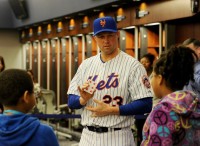
In many ways, this year could not have gone worse for Michael Cuddyer. His deal with the Mets was widely panned. He got off to a terrible start. He then got injured. Basically, he was a Mets free agent acquisition.
With the emergence of Michael Conforto and the Yoenis Cespedes trade, Cuddyer’s role diminished. He became a pinch hitter and a platoon player spelling Conforto and Lucas Duda. It was quite the fall from grace for a player who was once considered the Mets key offensive acquisition. The only question remaining would be how Cuddyer would respond.
In the second half, he’s hit .350/.404/.525. As a pinch hitter, he’s hit .333/.381/.333. He’s hitting .284/.370/.358 against lefties. Basically, he’s accepted his role, and he’s excelled. It’s a good thing too because the Mets are going to need him in the NLDS with the Dodgers throwing Clayton Kershaw, Alex Wood, and Brett Anderson.
Cuddyer said he came to the Mets to win. It’s one thing to say it. It’s another to do everything you can for a team to help them win, even if it means making the most out of a diminished role. We’ve seen most players go the other way when these things happen. Not Cuddyer. He turned things around, and he’s s key part of this team.
For that, he deserves our respect.
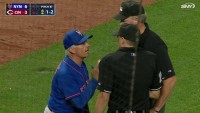
There are a number of stages to a player’s career. The first is when you’re called up and you’re learning. The second is when the league finds out more about you and adjusts. The most important is how that player responds.
It seems we’re at the response stage for Hansel Robles and his quick pitch. The league seems to have adjusted to the quick pitch with incessant whining causing the umpires to have to intervene. Usually, the umpire would call it a no pitch, but for the first time yesterday, the umpire ruled the pitch to be a ball. Under the rules, the umpire has that right.
The issue then becomes what exactly is a quick pitch? Reading the MLB rules is like reading any modern statute. It’s needlessly long and open to interpretation. I can best sum it up as a quick pitch is a pitch made when it is purposefully made when the pitcher knows the batter isn’t ready. Talk about open to interpretation.
In theory, the hold plate umpire is supposed to hold time until the batter is set in the box. Once the umpire let’s gameplay resume, the pitcher should then be able to throw a pitch. Therein lies the problem. Each time Robles has been called for a quick pitch, time was in. The umpire already judged the batter to be ready. Therefore, how could that same umpire call a ball? He’s already determined the batter ready, so how could that same batter be “off guard?”
Batters don’t like being rushed, so they’ll do anything to slow the game down. The best tactic they have at their disposal is whining. They’re doing it now with Robles, and they’re succeeding. I’m glad Collins argued last night. There needs to be a clear bright-line rule. The Mets need to get a conference call with MLB and the umpires to figure it out.
Absent that, Robles should keep doing what he does best, which is quick pitch. He just needs to be cognizant not to do it with three balls in the count so as not to award a walk. If he does quick pitch again, and it’s called a ball, he needs to collect himself better than he did last night. That’s the real adjustment needed.
He’s an important part of this bullpen in the playoffs, so he better figure it out quickly.
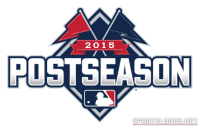
Terry Collins is 100% correct that you worry about getting to the playoffs, and then you let the chips fall where they may. I know I’m in the minority on this, but I don’t want the Mets fighting for homefield in the NLDS.
The first reason is the rotation. We may not know who the fourth starter is, but we do know that Jacob deGrom, Matt Harvey, and Noah Syndergaard will get starts. We also know Clayton Kershaw and Zack Greinke will start Games 1 & 2. With Syndergaard’s home/road splits, I don’t want the Mets to have a reason to start Thor in Game 2 to keep him at Citi Field over Harvey. I like the idea of coming home and having a huge edge in the pitching matchup with Thor at home.
The second reason is the Mets offense. Kershaw and Greinke are hard enough to hit. I know the Mets will be hitting in the shadows at Dodger Stadium, but the Mets hitters are better on the road. Yoenis Cespedes hits .220/.283/.484 at Citi Field. Daniel Murphy is hitting .256/.296/.429. Curtis Granderson is hitting .236/.331/.415 (although his Dodger Stadium numbers are similar). Travis d’Arnaud is .252/.320/.461. The Mets offense travels better. Let the have a better shot at getting going early in the playoffs than struggle at home.
The final and most important reason is the importance of Games 3 & 4. The Mets would be coming home either down 0-2, tied 1-1, or up 2-0. If you’re down 0-2, there’s no place you’d rather be at home to stave off elimination. You’d also rather be home tied so you have a shot to go up 2-1 in front of a rabid fan base. If the Mets come home up 2-0, after beating Kershaw and Greinke, series over.
Therefore, I don’t think homefield advantage is something you don’t want to get. Just get the team healthy and ready for the NLDS.
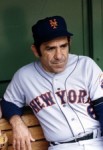
With the passing of Yogi Berra, i figured i should ask a Berra-Mets trivia question. With Berra ending his playing career with the Mets, and with Berra managing the Mets to the 1973 pennant, i thought the quiz should see if you can name the former Mets players who managed for them. Good luck!
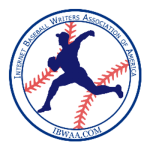
Unlike the MVP Award, there seems to be no guidelines for any of the other awards. Manager of the Year included. Typically, I have found this has been treated more as best record award more than a true analysis as to who performed the best.
The Manager of the Year is tricky because other than win-loss record, there really isn’t a statistic upon which you can rely. Sure, you can look at the difference between the record and the Pythagorean Record to see if a team has overachieved or underachieved. You can look at the utilization of shifts and defensive runs saved. I’m sure there’s a million other stats I’m not even mentioning right now.
There’s also the Dusty Baker issue. There are a number of problems people have with him as a manager. Mostly, people have problems with him as a tactician. However, what’s overlooked is how he got a lot out his teams like he did with the Giants. However, that same style didn’t work with the Cubs. Ultimately, what we learn here is that certain managers are better with different players and teams.
Overall, this is a subjective award. You’re really trying to judge who did the best job with the team he had. Personally, I think you can give this award to the same guy every year because baseball people tend to agree on who the best managers are. Unless, they have an uncharacteristic bad year or someone has a great year, you should vote for the best manager.
Overall, I think this one will be my most difficult vote in any particular year.

Coming into this season, the Mets did not build a very strong team. Sure, there was the good young pitching and David Wright, but there was a shallow bench and no everyday SS on the roster.
The Mets were trying to put a round peg in a square hole with Wilmer Flores at SS. The reason was because the Mets gift wrapped the position for Ruben Tejada in 2012 when Jose Reyes wasn’t re-signed. Tejada faultered as he would again in 2013 and 2014. Tejada faultering meant the Mets had to hand the job over to someone else, which was usually our Magic Number 3 Omar Quintanilla:

Quintanilla’s first fill-in role in 2012 was his Carter best year with him hitting .257/.350/.371 in 29 games before he was traded to the Orioles. In the second act in 2013, he would wear the number 3 for the 74-88 Mets. This time around he would only hit .222/.306/.283 in 95 games, arguably the worst year in his career. Quintanilla would change numbers again in 2013, but he wouldn’t have any better luck in what would be his last year in the majors.
Quintanilla reminds me that no team should hand anything to a player. They should have to earn it. As case in point, after having to fight to get a job, Tejada is having the best year of his career with a strong September where he’s hitting .405/.476/.568.
This is all a result of the Mets having a strong roster where players have to earn their playing time. We’ve seen with past Mets teams this lack of competition leads to complacency and poor play. You then have to overplay people like Quintanilla, who give it their all, but are unfortunately limited players.
So let’s tip our caps to Magic Number 3 Imar Quintanilla for reminding us that it’s a good roster with good internal competition that drives a team forward.
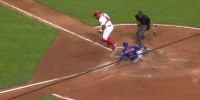
The most important part of today’s game was Steven Matz‘s start because you want to determine if he should start in the NLDS.
Tonight, there was some good and some bad. Matz struck out a career high eight batters and looked strong early. However, he couldn’t hold onto a 3-1 lead. He only lasted 5.2 innings. He left the game with the game tied at 3-3.
Offensively, it seems the Mets bats woke up. It could’ve been just clearing their heads. It could’ve been seeing the Nationals losing as they took the field. It could’ve been the difference between Citi Field and The Great American Ballpark. Whatever it was, the Mets put six runs on the board.
Most impressively, the team responded to losing the lead by scoring three in the seventh. It started with Curtis Granderson scoring on a Daniel Murphy triple. This was followed by a Yoenis Cespedes RBI single, and a Lucas Duda RBI double, off a lefty to boot.
Itwas an impressive night for Murphy, Cespedes, and Duda. Murphy went 3-5, with a double, a triple, two runs scored, and the game winning RBI. Cespedes was 2-4 with a run and two RBI. Duda was 2-3 with 2 doubles, a walk, and two RBI.
The bullpen was solid with Erik Goeddel getting the win. Terry Collins smartly used Addison Reed in the seventh with the top of the Reds lineup due up. Hansel Robles allowed a homerun (more on that later). Jeurys Familia rebounded from last night to record his 42nd save preserving the Mets 6-4 win.
Getting back to Robles, there was an incident prior to the Jay Bruce homerun. During the at bat, Robles of course tried to quick pitch him since the bases were empty. The home plate umpire appeared to yell at him prompting Collins to come out of the dugout. Of course, Angel Hernandez tried to intervene from first base even though the home plate umpire and crew chief was there.
After everything, Robles allows the home run. With Robles’ quick pitch tendencies, this issue will arise again in the playoffs. If Robles wants to continue to quick pitch, he’s going to need to respond better.
On the bright side, this is going to be an issue because the Mets are going to go to the playoffs.

